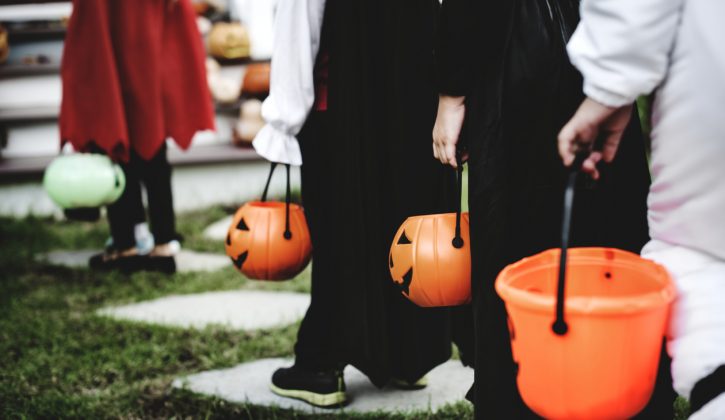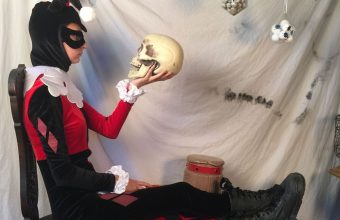October is here, and that means several things: school is back, summer clothes can finally be packed away for the year, and it’s time to get creepy with your Halloween decor and costume planning. Halloween is the best, even this year. And honestly – I can’t wait to cover our yard in skeletons and steal my kids’ miniature chocolate bars for weeks on end. It’s going to be great.
But here’s the thing. Can we collectively agree to NOT be cultural appropriators this year? Because it’s high time we knew better but clearly, as a society, we do not. (Just watch the news.)
It’s not just overt racism that’s a problem (though to be clear, that’s a HUGE problem). Each and every year, I see them: costumes that stereotype, mock and even sexualize non-white cultures. I’m talking about geishas, sugar skull makeup, ‘Indian Princesses’ (the language alone being problematic) and other trivialized representations of people of colour. Sometimes, the costume represents a specific person or character (Pocahontas, for example) and other times, it’s something vague, like “Mexican Man” (a real costume sold in stores). Don’t even get me started on costumes that involve blackface, which I cannot believe we are still debating in 2020.
Let’s address one thing immediately because it’s important: I am not a person of colour. I’m white and so are my kids. I’ve never experienced racism or had it directed at my family, and I’m absolutely not the most important voice in this conversation – not even close. That said, I’m not comfortable staying quiet or apathetic about an issue that hurts marginalized communities. Apathy can be just as loud as hatred, and that’s not how I want to raise my children. It’s not enough to ‘not be racist’ – that’s the bare minimum of standards, honestly – it’s about being conscious of how our actions affect others, particularly if you’re a privileged person such as myself.
So back to costumes.
There are literally ENDLESS possibilities for what children (and adults) can be for Halloween. A shark, a wizard, an evil clown, a crime-fighting cartoon puppy, a banana, a giant hot dog, a creeper from Minecraft, a velociraptor, whatever. Follow your dreams and get weird, kids. When I was six, I dressed up as a flower pot and it was awesome. For years, I went with different characters from The Wizard of Oz – Dorothy, the witches, even one of the lollipop kids. There are no limits.
…except there are if you really care. And there should be.
Another person’s culture is not your costume. It’s not okay, even when your intentions are good. People of colour do not exist for the amusement of white people, and that includes dressing up in a way that mocks or hurts marginalized communities – even inadvertently.
When you “celebrate” your love for a character or culture by dressing up as a caricature of it, you’re not honouring anyone – you’re hurting them. This is true whether you want it to be or not, and even if someone in that ethnic group told you it was okay. That person may have been avoiding conflict or trying not to hurt YOUR feelings, and even if they truly don’t care, they certainly don’t speak for an entire community that does – so stop. And please, for the love of all things holy, don’t be a “sexy” version of any culture. That’s beyond awful, and there’s no fathomable reason for it. Be a flower pot instead.
Let’s use Indigenous culture as an example of Halloween costumes gone wrong. It’s very common to see “Indian Princess” and “Indian Warrior” costumes for sale in popular costume stores. I use quotation marks here because that’s not my language – it’s the way these costumes are labelled, often with a sexualized twist. But let’s look at the reality: Indigenous people have been horribly mistreated and discriminated against for hundreds of years. Sometimes, they are completely ignored. There are First Nations communities in Canada RIGHT NOW that don’t have clean drinking water. Some haven’t had it for decades. There is a full-on epidemic of missing and murdered Indigenous women (MMIW) in this country, and the last residential school was in operation until 1996. This is but a FRACTION of the list I could make, but you get the point.
Indigenous people have been abused by this country. Think about that – really, truly sit with that information and imagine yourself in that life – and then try to tell me that it’s okay for a non-Indigenous person to wear some knock-off version of a sacred ceremonial headdress, just for fun. It’s not okay. It’s not just headdresses or sexed-up ‘Native Girl’ costumes or the problematic representation of Pocahontas – it’s all of it. In no way, shape or form should a non-Indigenous person dress in costume as an Indigenous person. The same goes for other cultural appropriations. We need to accept this, and we need to teach our kids not only what is hurtful, but WHY. This is how we do better.
Granted, the person wearing the costume often doesn’t mean to offend – and that’s a good start. It means there’s room for compassion and an informed desire to change. When I see a person trick-or-treating in a feather headdress, I cringe hard and feel sad – but I don’t necessarily think the wearer is a bad person. I think they’re unaware of the impact their actions may have, and I’m hopeful they will learn and grow. That headdress may be beautiful, but it’s not yours to play with.
A simple way to tell if a costume is problematic is to ask the following questions:
- Does this costume marginalize or sexualize a culture other than my own?
- Is it attempting to honour a person or culture by wearing items that are unique to that culture, even though I/my child won’t face the same discrimination this person/culture faces?
- Have I/my child altered my skin tone for this costume?
If you even HESITATE when answering one of these questions, it’s time for a new costume idea.
There may be areas of genuine confusion (should my white daughter dress up as Princess Jasmine? What about Moana?) and honestly, there are some grey areas there. The character of Jasmine was from a fictional country but used many harmful stereotypes of Arabic cultures, which is why it’s often considered offensive. The team behind Moana, however, was praised for working with cultural advisors to avoid this same fate and was applauded for doing a pretty great job (there have been minor criticisms, but largely, the film is viewed as being celebratory and respectful of Polynesian culture).
Knowing this, a Moana costume (clothes only, without any altering of skin tone) may seem harmless to a lot of people – including those of Polynesian descent. But others of Polynesian descent have expressed displeasure in seeing their culture in costume form, much in the same way an Indigenous headdress is sacred. Maui costumes were actually pulled off the shelves with apologies, as they involved brown mesh sleeves that darkened the wearer’s skin tone while depicting cultural tattoos (this is understandably different than simply putting on a Moana skirt or a Princess Tiana dress). But where is the exact line? That can be harder to determine, especially if you’re not a part of the culture being depicted. My opinion, personally, is when in doubt, move on.
It’s better to play it safe than it is to cause deep, lasting hurt to another person.
I’m not trying to be the fun police or super politically correct. I don’t want to ruin your Halloween. I just want people to acknowledge and consider the harm that befalls people of colour when they are treated like a dress-up game. It’s a terrible cycle of behaviour that has no place in my house or modern society. Let’s end racism, already, or at least stop being so damn complacent about it. We made a little progress on addressing sexism this year, sort of, and that helped (because what is racist Halloween’s best friend? Sexist Halloween! But that’s another post.)
Halloween should and can be fun for EVERYONE – not just the most privileged among us. Let’s be awesome parents that teach our children love and respect, uplifting others instead of pushing them further down. Kindness is a look you’ll never regret.
There are many excellent articles that dive deep into the impact of cultural appropriation, many of which were written by individuals who have experienced racism in their own lives. I encourage you to seek out and read these articles, as their words need to be heard far more than mine do.
Tagged under: Halloween,halloween costumes
Category: family-life,halloween






